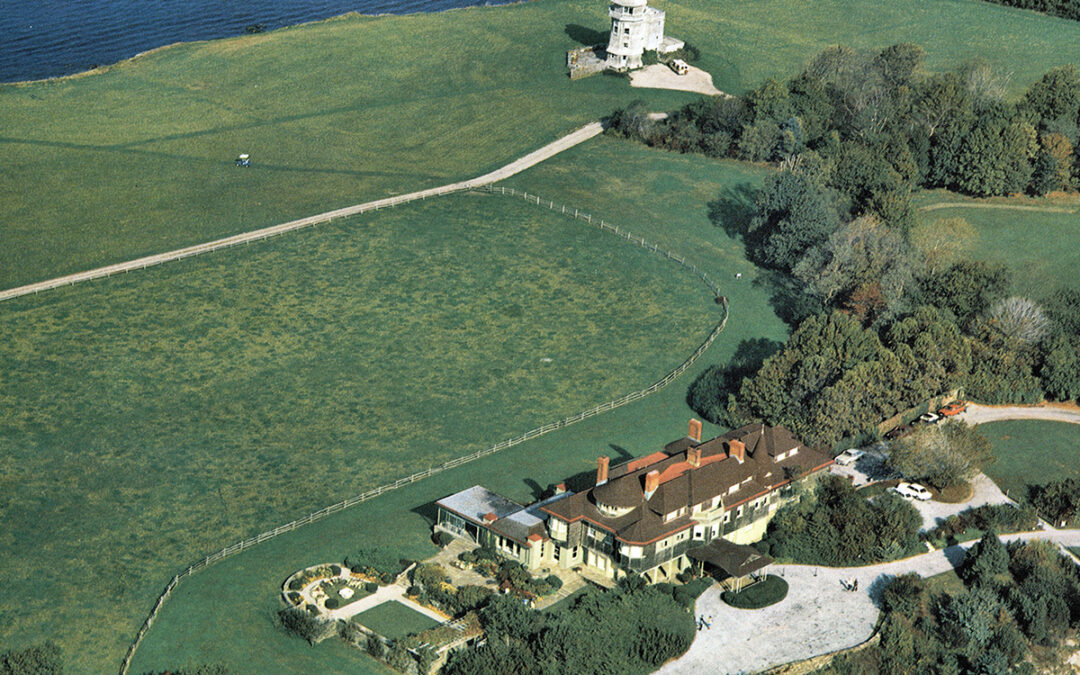Aerial View of Hammersmith Farm (Newport, Rhode Island)
Hammersmith Farm is a sprawling estate in Newport, Rhode Island, steeped in history and anchored by a magnificent Victorian Era mansion. It embodies the Gilded Age, an era of architectural grandeur and societal prominence for Newport. It has additional historical significance as a childhood haven for Jacqueline Bouvier Kennedy and the part-time “Summer Whitehouse” during the Kennedy admiration.
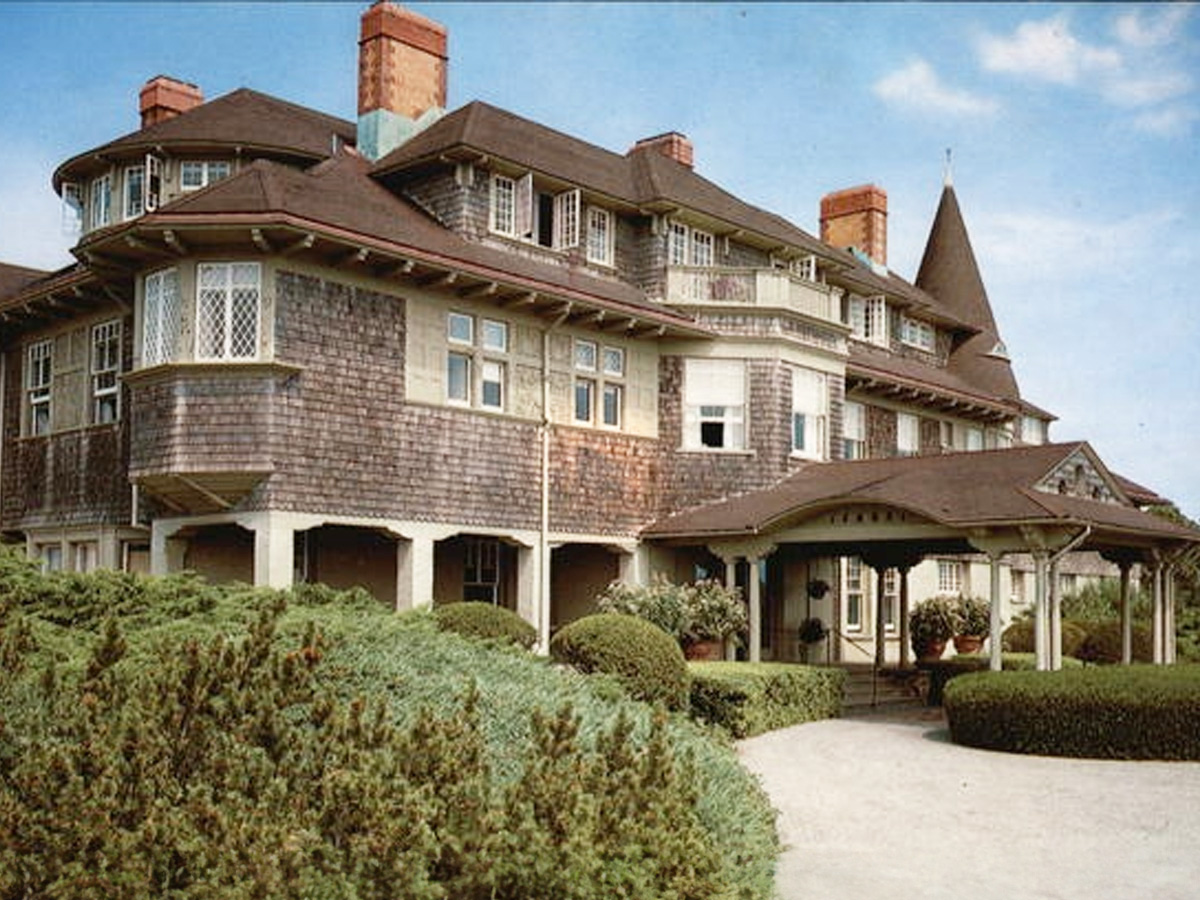
Front of Hammersmith Farm (Newport, RI)
The land upon which Hammersmith Farm rests traces its origins back to the 17th century. William Brenton, the second governor of Rhode Island, established the first farm on the site in 1640, and christened it “Hammersmith Island.” The name has continued to the present day and carries the weight of history through the centuries. In 1887, John W. Auchincloss, a prominent New York businessman, commissioned architect Robert H. Robertson to design a grand, 28-room Victorian mansion. The architectural style reflected the prevailing trends of the era, showcasing a symmetrical facade, wraparound porches, and a shingled exterior – a quintessential blend of Newport’s Queen Anne Revival and the emerging Shingle Style.
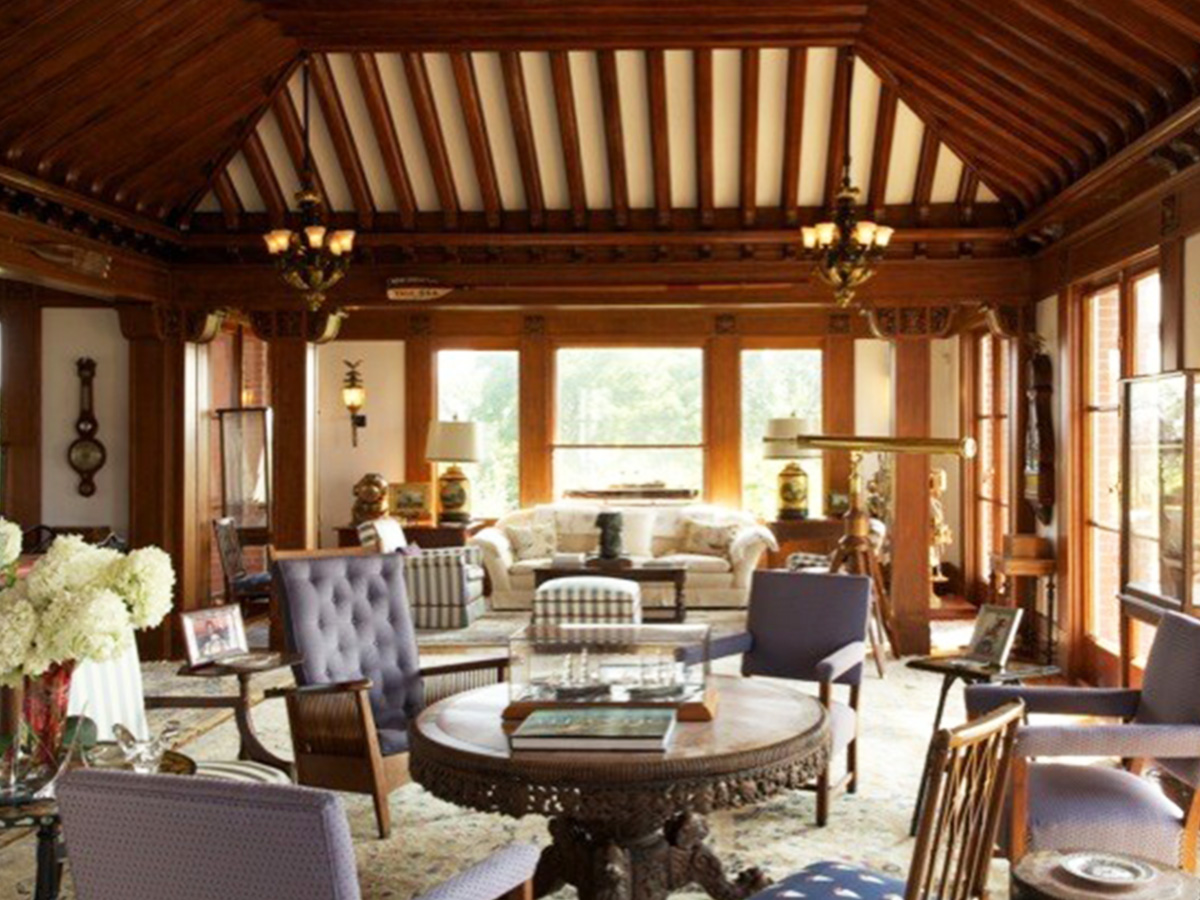
Living Room (Newport, RI)
Hammersmith Farm’s historical significance is inextricably linked to the legendary Kennedy family. Jacqueline Bouvier, who later became Jacqueline Kennedy Onassis, spent her childhood summers growing up on the estate. The sprawling grounds provided a refuge, a place where she could escape the prying eyes of the public and forge lifelong memories. But Hammersmith Farm’s connection to the Kennedys extends beyond childhood solace. In 1953, it played a pivotal role in American history as the setting for the wedding reception of Jacqueline Bouvier and Senator John F. Kennedy. The estate, decked out in celebratory grandeur, served as the setting for the reception of one of the most important society unions in history that would have enormous political importance. Following Kennedy’s election to the Presidency, Hammersmith Farm served as an unofficial summer White House during his too-brief term in office. Images of the young couple and their children on the estate’s manicured lawns captured the imagination of a nation and solidified Hammersmith Farm’s mystique and place in American political lore.
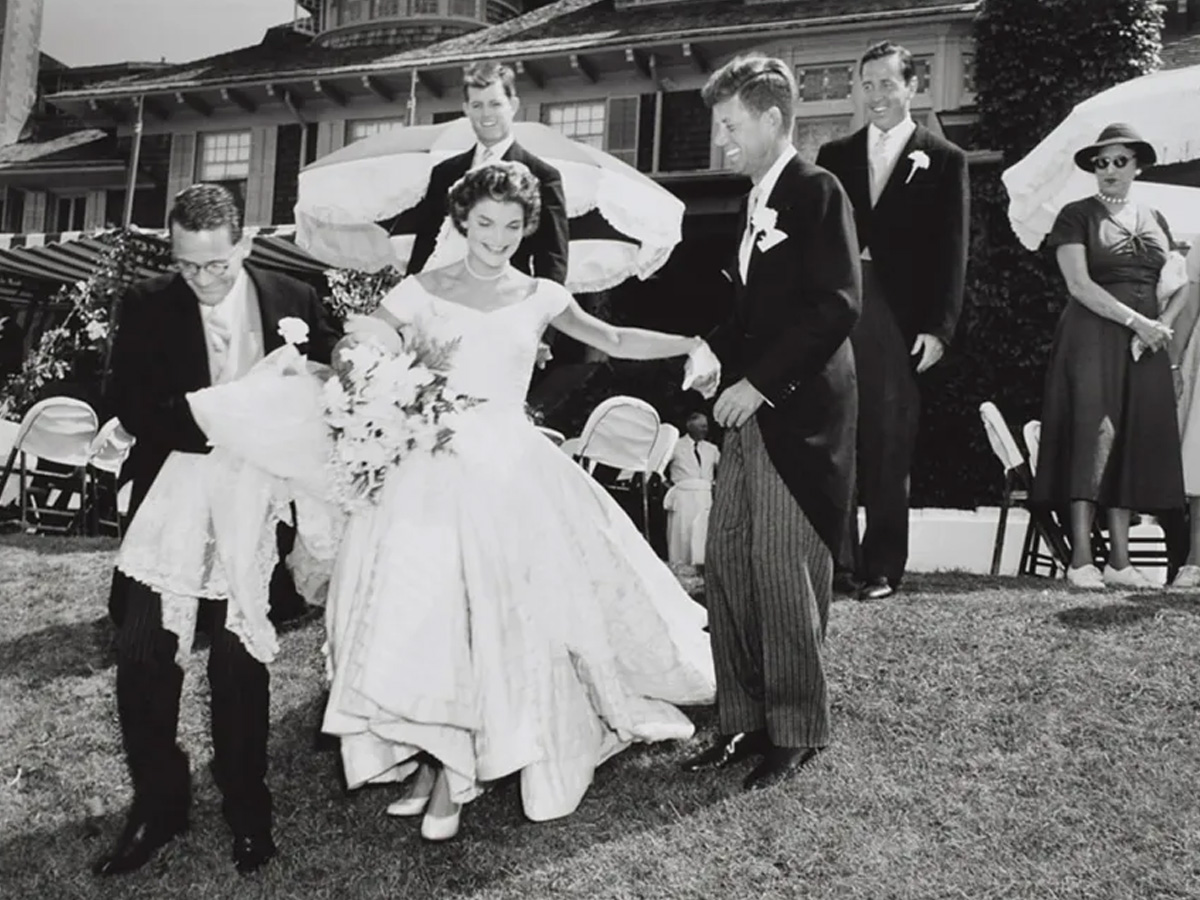
Wedding Reception Photo of John F Kennedy & Jacqueline Bouvier at Hammersmith Farm (Newport, RI)
Beyond its historical significance, Hammersmith Farm holds importance within Newport’s rich architectural fabric. The Victorian mansion exemplifies the grandeur and craftsmanship characteristic of the era. The symmetrical design, with its central pavilion flanked by projecting wings, embodies the sense of balance and order prevalent in Victorian architecture. The use of shingles, a hallmark of Newport’s coastal architecture, seamlessly integrates the mansion into the surrounding landscape. Notably, the Olmsted Brothers, renowned landscape architects who designed Central Park in New York City, also lent their expert talents to the design of the estate’s grounds in 1897. Their influence is likely evident in the sweeping lawns, mature trees, and carefully curated gardens that complement the architectural grandeur of the mansion.
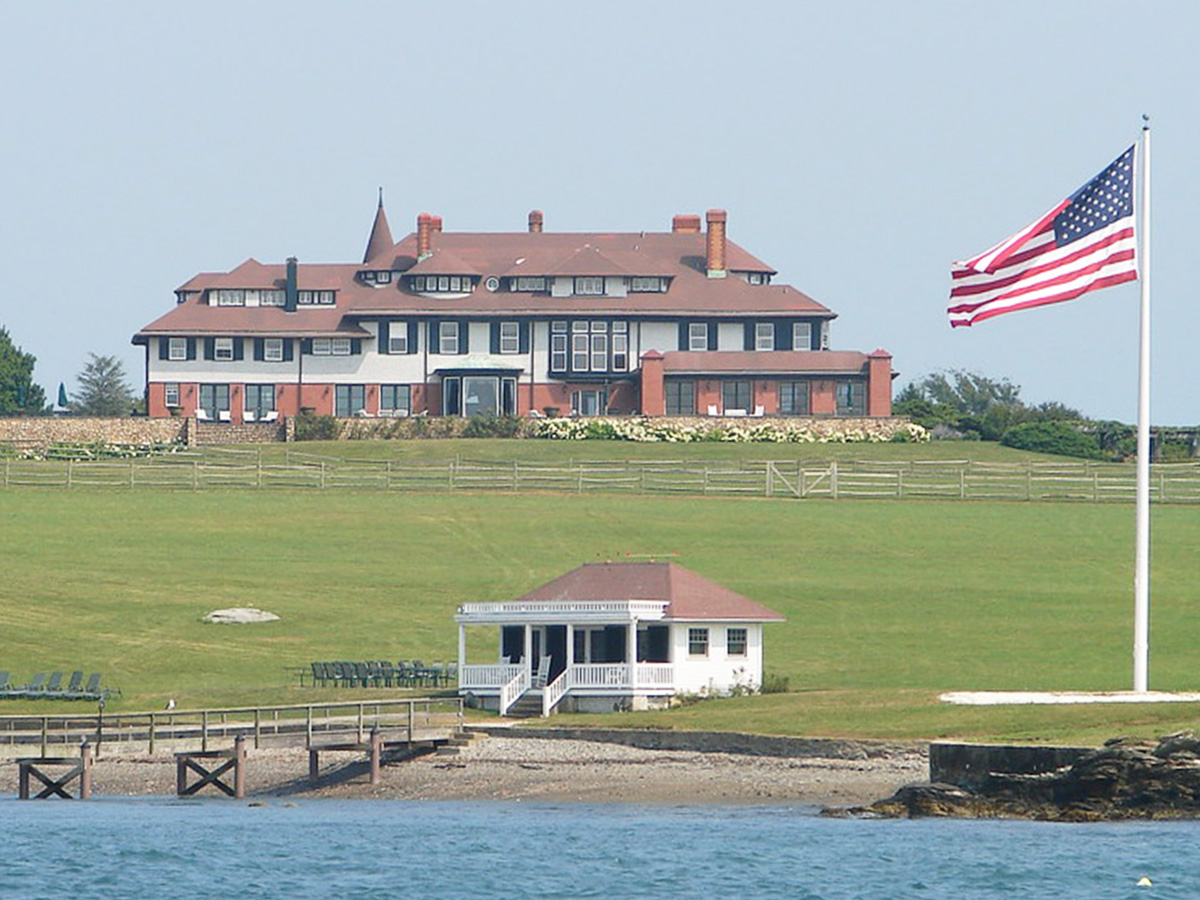
Hammersmith Farm View From Water (Newport, RI)
While Hammersmith Farm is no longer accessible to the public, its legacy endures. It stands as a testament to a bygone era of casual grandeur that is the hallmark of the “Newport Cottage” and serves as a reminder of the historic who have inhabited the building in the past. The many architectural details in the building help bridge the evolution of the Queen Anne Revival into the Shingle Style which was blossoming around the time of its construction. The farm still has horses and sheep on the spacious green fields that surround the mansion, which sits high on a ridge overlooking Narragansett Bay on the West side and the fields and Newport Harbor to the East. This recalls Newport’s beginnings as an idyllic agricultural enclave nestled near an important Colonial Era seaport. Like Newport itself, Hammersmith Farm has had a rich and storied history, from the Colonial Period, through the Gilded Age, into the Twentieth-Century, and even to the present day.
Explore the transformation of another past project by clicking here.
Looking to remodel your home? Let’s connect.
Join the Architectural Forum to stay up-to-date with architectural news from Rhode Island and abroad.
Ross Sinclair Cann, RA, AIA, LEED AP, is an author, historian, educator, and practicing architect living and working in Newport, RI. He studied with Professor Scully as an undergraduate at Yale and was a teaching assistant for Robert A.M Stern at the Columbia School of Architecture in New York.
At A4 Architecture + Planning we are expert at integrating building codes into our designs to provide safer and more long-lasting building solutions for our clients. If you are interested in learning more about what can do for you reach out to us at any time!
